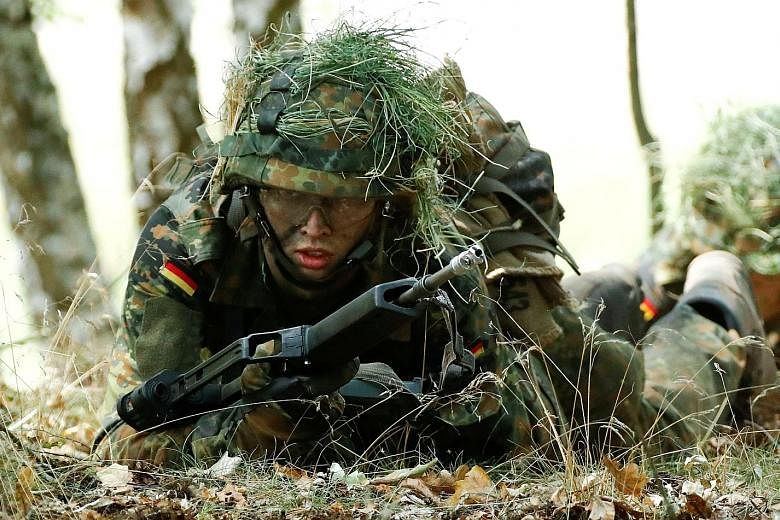VIERECK (Germany) • When Marlon finished high school in Germany, a military career seemed far more appealing than working on a car production line.
So, a few months before he turned 18, he joined the German army, becoming one of more than 10,000 minors to sign up since mandatory military service ended in 2011.
"I wanted to experience something and get to know my own limits, to see how far I could go," Marlon, who asked for his last name not to be used, told Reuters at a base in Viereck, near the Polish border in north-eastern Germany.
The German military, or Bundeswehr, has dramatically stepped up its recruitment efforts as part of a broader reset following Russia's annexation of Crimea from Ukraine in 2014.
Last year, Germany said it would increase the size of its armed forces to 198,000 active soldiers by 2024, from 179,000.
Pressure on Berlin to beef up its military mounted again last month when US President Donald Trump told a North Atlantic Treaty Organisation summit that Washington could withdraw support for the alliance if Europe did not boost military spending.
To help attract new recruits, the military has targeted youngsters with slick online video campaigns, drawing criticism from some left-wing politicians and child welfare advocates in Germany, where the army remains a sensitive career choice more than 70 years after World War II.
But the campaigns are paying off.
Last year, 2,128 people under 18 joined the German army, up 11.4 per cent from 2016 and accounting for 9 per cent of new recruits, according to government data.
With lively music and scenes showing the lives of young soldiers, the Bundeswehr's shows on YouTube, which is owned by Alphabet, have attracted more than 64 million views.
In October, traffic at the Bundeswehr jobs website increased 60 per cent during a six-week broadcast of Mali, a YouTube series centred on eight soldiers serving in the United Nations' peacekeeping mission in the West African country.
The Bundeswehr Exclusive YouTube channel has more than 330,000 followers, and its latest production portrays the lives of a group of young paratroopers.
The army is also active on other sites such as Facebook, Instagram and Snapchat.
According to a Trendence Institut survey of 20,000 school students across the country, the military is now considered Germany's third most attractive employer, behind sportswear maker Adidas and the police in first place.
Overall, the army spent about €35 million (S$55.5 million) on recruitment last year, more than double its spending in 2011, the year compulsory military service ended, annual Parliament reports about the Bundeswehr showed.
"The Bundeswehr today is a volunteer army... Therefore, it must approach young people to win them over," a spokesman for the personnel management department at the Bundeswehr said.
Before signing up, Marlon said he browsed the army's website and watched a series of YouTube videos.
He needed his mother's consent to join because he was under 18, but she was happy to give it and is now pleased her once-messy son has become more organised, Marlon said.
Recruits under 18 in Germany undergo military training like other adult trainees, but they have special provisions such as not being allowed to participate in guard duty or foreign missions, and weapons are used only for educational purposes.
Ms Ilka Hoffmann, a board member at the GEW union that represents about 280,000 teachers, social workers and education workers, said the nature of military work meant there should be more caution about hiring under-18s.
"This is not a normal profession. In no other profession does one learn to kill, and is one confronted with the danger of dying in war. That is the one difference," Ms Hoffmann said.
REUTERS

